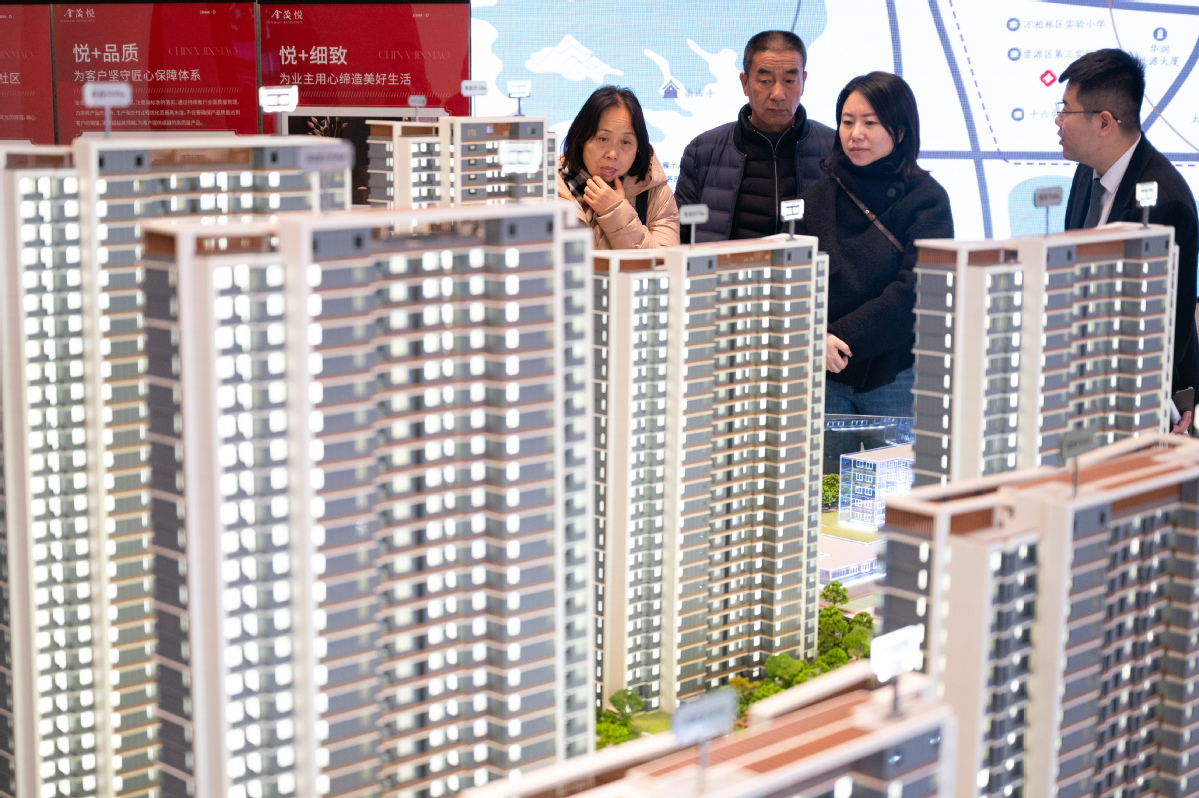Healthier property sector key to boosting growth


This year's Government Work Report, for the first time, proposed stabilizing the real estate market, showcasing China's strong focus on the critical sector. Given its substantial influence and associated risks, a healthier property industry will play a vital role in boosting China's economy.
Driven by a series of supportive policies, the decline in housing sales and prices has gradually narrowed, and the real estate market in first-tier and some second-tier cities has shown signs of stabilization since the fourth quarter.
However, risks still exist. Some real estate enterprises are facing heavy liquidity risks, difficulties in repaying their debts and continuous declines in returns on investment brought about by rising asset impairments. Local governments are bearing fiscal pressure from dwindling land transactions, while slumping property investment levels undermine both economic growth and investment confidence of private enterprises.
This year, the government vowed to conduct more forceful housing policies to further stabilize the real estate market. In terms of boosting demand, China will adjust the restrictive measures in light of local conditions, and expedite renovations of urban villages and dilapidated housing so as to fully release demand potential.
As for the supply side, China will revitalize stocks of land and commercial buildings, promote the acquisition of commercial housing stocks and give greater autonomy to city governments in terms of acquisition subjects, prices and uses, while expanding the scope of affordable housing re-lending.
To prevent debt risks among real estate enterprises and support the work of ensuring deliveries of presold homes, China will leverage the real estate financing coordination mechanism, promote the implementation of a "white list" system and improve the liquidity of property firms.
Aiming to accelerate the turnover of existing real estate assets, China will give greater operational autonomy to local governments in terms of local purchases and storage, benefiting the revitalization of stock assets and the alleviation of liquidity risks of property enterprises.
China is also taking a more suitable coordination mechanism for urban real estate financing. With the expansion of the "white list", real estate enterprises are encouraged to fully use the special loans to ensure deliveries of presold homes. It is expected that in 2025, the approval amount of "white list" special loans may be expanded to 8.54 trillion yuan ($1.18 trillion), which will better support the construction of real estate projects and mitigate debt risk among developers.
The Government Work Report also noted that, "to meet people's demand for high-quality housing, we will improve the standards and regulations on building quality homes that are safe, comfortable, eco-friendly and smart."
To improve people's living standards, China will carry out renovation plans for urban villages and aging residential assets, and promote the direct granting of monetary subsidies for resettlement. It is hoped that by this way, the number of actual urban village transformations this year will increase to 1.5-2 million units, driving housing demand by 75-100 million square meters.
Real estate enterprises are encouraged to provide more commercial houses of more than 140 square meters per unit on the supply side of new housing to better match demand for improved housing in major cities. As the construction concept of "green, modern and intelligent" has gradually taken root among households, we're also likely to see an increase in the proportion of "green and smart" decorative materials, thus meeting people's new housing needs.
If all the measures are implemented effectively, it is hoped that this will stem the downturn and restore stability in the property sector this year. It is estimated that the decline in housing sales is expected to slow significantly throughout this year.
Housing prices in various cities are showing signs of stabilization. Prices of newly built commercial housing units and secondhand housing in the country will fall by about 1 percent and 2 percent year-on-year, respectively, which will be 4.7 percentage points and 6 percentage points narrower than that at the end of 2024.
And the maturity scale of real estate enterprise debt in 2025 will be further reduced compared with 2024. It is estimated that the scale of various debts among property firms during this year will be about 3.1 trillion yuan, and the overall expenditure scale will be about 800 billion yuan less than that in 2024.
The activity of land transactions is increasing with the support of land reserve special bonds. It is expected that the shrinking overall land acquisition capacity of real estate enterprises will mitigate in 2025, as the annual land purchase funds will be about 3.44 trillion yuan, a year-on-year decrease of 3.5 percent, with the decline 5.2 percentage points narrower than that in 2024.
The current round of real estate market adjustment may gradually come to an end, and the inventory-to-sales ratio of commercial housing will gradually fall from relatively high levels, with the property market in major cities taking the lead in stabilizing the sector. Some of the main indicators of the industry may stop falling and some may narrow the decline. And market confidence will also be consistently restored with the risk of real estate sector exposure gradually narrowing this year.
The writer is a council member of the China Chief Economist Forum and head of the Guangkai Chief Industry Research Institute.
The views do not necessarily reflect those of China Daily.




































